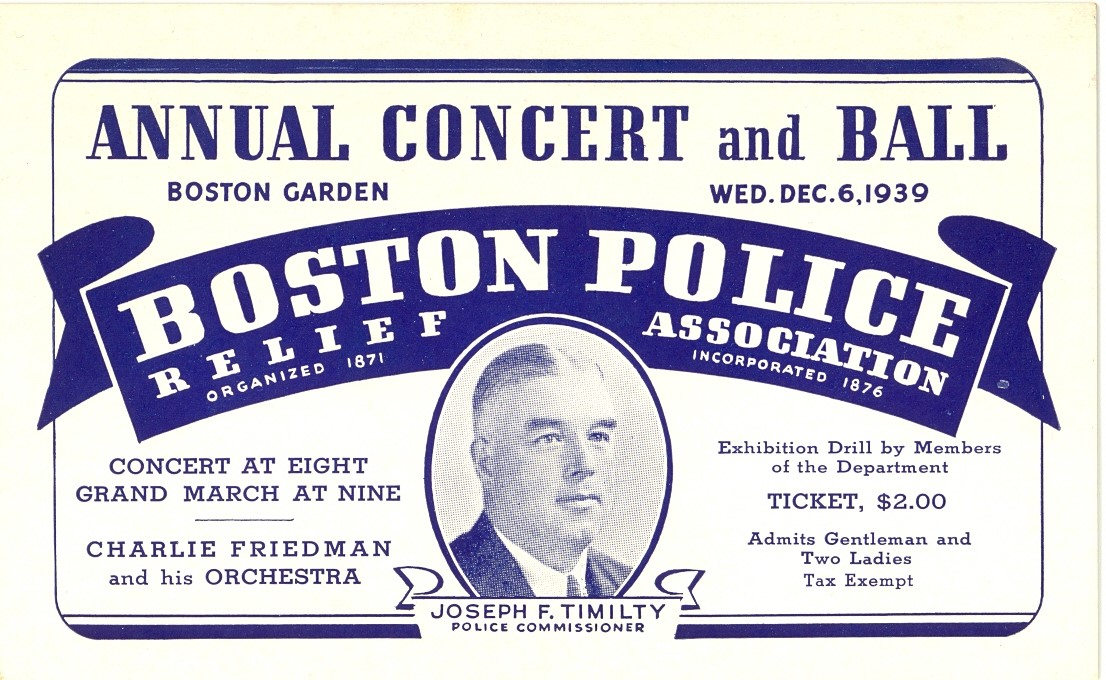 The North End has always had an uncomfortable yet symbiotic relationship with the police officers assigned to the district. With a badge and gun, police officers had tremendous authority and the power to selectively enforce all the incomprehensible rules and regulations that were on the books. They could literally make or break a small businessman. This created a certain amount of tension with North End residents but there were ways to ameliorate this and that’s the subject of this article.
The North End has always had an uncomfortable yet symbiotic relationship with the police officers assigned to the district. With a badge and gun, police officers had tremendous authority and the power to selectively enforce all the incomprehensible rules and regulations that were on the books. They could literally make or break a small businessman. This created a certain amount of tension with North End residents but there were ways to ameliorate this and that’s the subject of this article.
A couple of weeks ago, Tom Schiavoni wrote a column on this web site about the overly zealous enforcement of some piddling regulation concerning the lack of a proper permit. An elderly couple, the Tammaros, was selling vegetables from a corner stand, something they had been doing for decades. A policeman showed up and closed them down because they lacked a permit to sell produce outdoors. Was the public health being endangered by their activities? Of course not and Tom rightly expressed his outrage at the city for harassing these harmless people while overlooking more serious matters like public drinking, double and triple parking and property destruction. This never would have happened seventy five years ago.
When I was a boy we actually had patrol officers who walked a beat. Those cops knew us and we knew them and they kept close track of all the activities on the streets they patrolled. They knew who was booking numbers, who was selling hot merchandise, which bar rooms were staying open beyond closing time and who was setting up fruit and vegetable stands on sidewalks and even streets. All these activities were technically illegal but they were tolerated and even encouraged because they were essential to the efficient functioning of the North End. But, as always, there was a price to pay.
My family owned a local bar room, Nick’s Tavern, which was at 3 Lewis Street. While going through some old ephemera from the tavern I came across several tickets to something called the Policeman’s Ball. Now, I never recall my father or uncles ever actually going to this ball. I’m sure it existed but no one I knew ever attended yet every business, legal or illegal, in the North End was expected to purchase dozens of tickets.
Parking was always a problem in the North End and cops on the beat would collect five dollars a month from everyone who didn’t want to get a parking ticket. A shop that set up sidewalk or street displays would give the police officer bags of free produce and the same thing happened with meat markets, dry cleaning establishments and on and on. We used to say that for a policeman being assigned to Station One was like hitting the number and cops waited years to get that plum assignment. In those days before special details police could supplement their salaries by working in districts like the North, West and South Ends. Of course certain activities were not allowed. Anything that would bring scrutiny from the news media like violent crimes, burglaries or sexual offenses was absolutely forbidden and the police would come down hard on anyone who disobeyed the unwritten rules. Old North Enders like to reminisce about how safe our neighborhood was, which is true, but the safety came from the selective enforcement of laws by the police. Everyone was making money and the system worked well as long as everything was kept quiet and under control.
Not many people realize that the North End was one of the few places in the city where abortions were performed. Pharmacists, sketchy physicians and Italian midwives (levatrice) were all involved in this secret activity. My Nonna, Colomba, had a friend named Jennie who lived on Cooper St. and was widely known throughout the city as an expert abortionist. My aunts told me that in the 1920’s the Governor’s daughter got into “trouble” while a student at Radcliffe. The Governor’s State limousine brought the unfortunate girl to Cooper St., pulled onto the sidewalk and waited while Jennie helped solve her problem. Abortionists had to pay their dues like everyone else and the only time one got arrested was when something went tragically wrong. There used to be a small pharmacy on the corner of Bartlett Place and Salem Street. One day I looked out my window to see the pharmacist being led away in handcuffs. Apparently, a procedure went wrong and a young lady died.
Every Christmas, I would help my father unload dozens of cases of booze, top shelf stuff like CC, Cutty Sark and Courvoisier. These were gifts for the local cops. All the guys from Station One would stop by, patrolmen would get a bottle of Canadian Club and the brass either the Scotch or brandy. That was the price of doing business in the North End and he didn’t mind but what bothered him was when cops from outlying districts came in expecting a bottle.
Things are different today. We have a terrific police commissioner and a professional police force. Petty crimes and payoffs, so far as I can tell, are not tolerated and we’re probably better off for it. But I can’t help wondering, if the Tammaro family had offered the police officer who shut them down a few ripe tomatoes would he have left them alone?
Nicholas Dello Russo is a lifelong North Ender and columnist. Often using vintage photographs, Nick tells the stories of growing up in the North End along with its culture and traditions. It was a time when the apartments were so small that residents were always on the streets enjoying “Life on the Corner.” Read more of Nick’s columns.




Lol lol Dr. My father did the same thing sometimes the patrolmen would come in The Blue Front twice my father would say(already knowing gee you look familiar) lol
Paul, just hearing the name “Blue Front” brought a smile to my face & many pleasant memories back.Along with Felicia’s your families business was one of favorite spots in the NE.
Nick I remmber the days when it all took place, and the ticket you show is fron the year I was Born
I love Your Stories.
Bobby Church
Joseph F. Timilty was appointed police commissioner by Mayor James Michael Curley in 1936. In 1943 he and six of his subordinates were indicted for “conspiracy to permit the operation of gambling houses and the registration of bets.” He was indicted twice and both times the charges were dismissed, probably because of a lack of witnesses. Governor Leverett Saltonstall refused to reappoint him. He ran for mayor in 1951 against John B. Hynes but lost in the primary. Hynes was the mayor who demolished the West End.